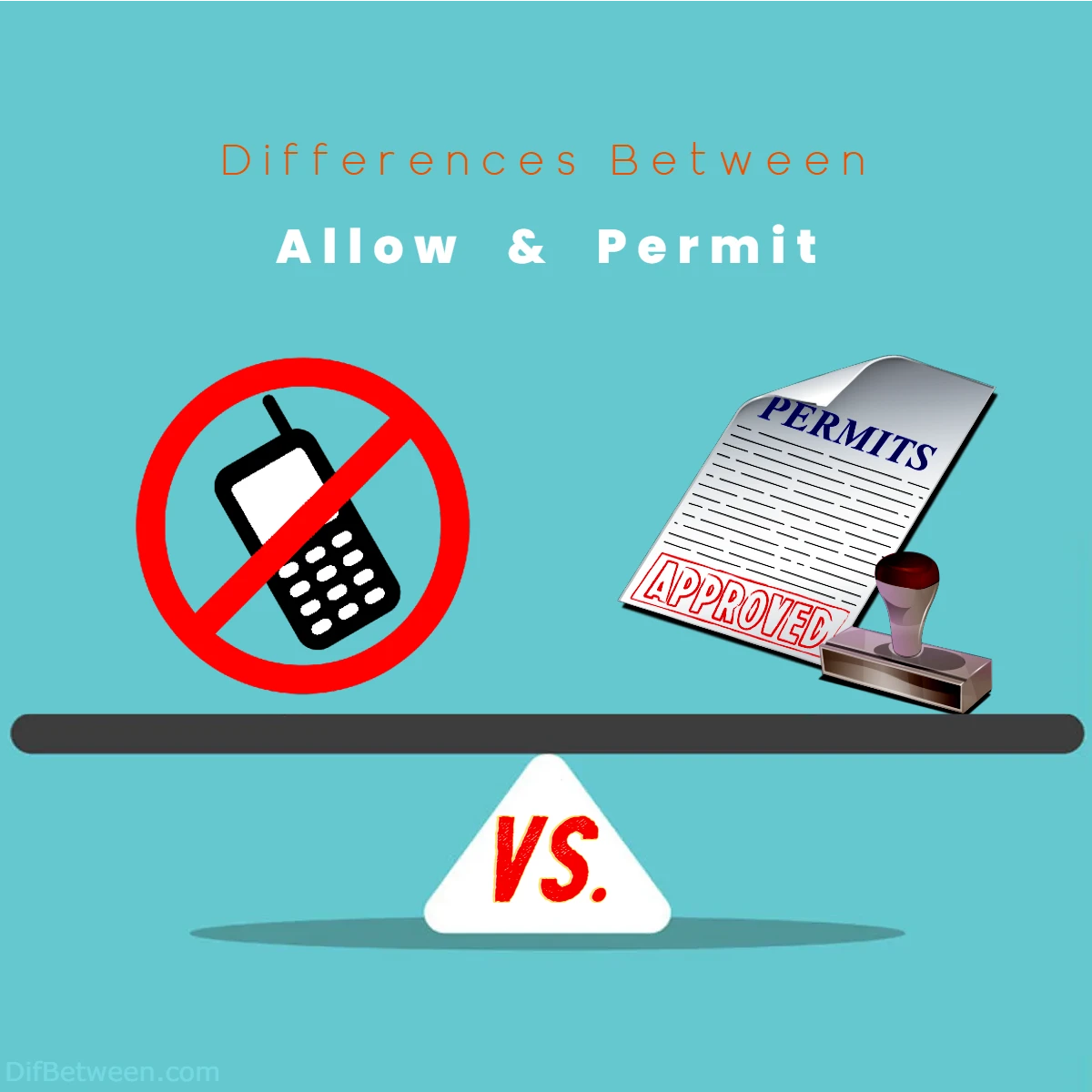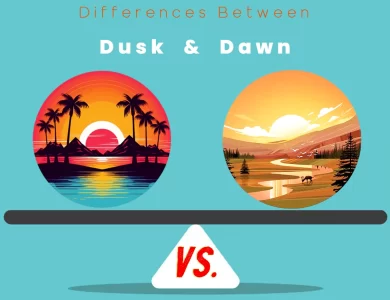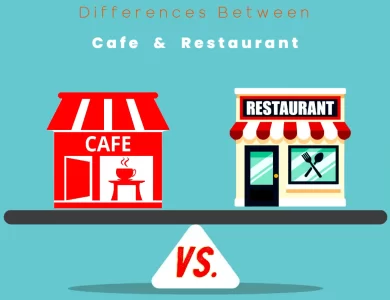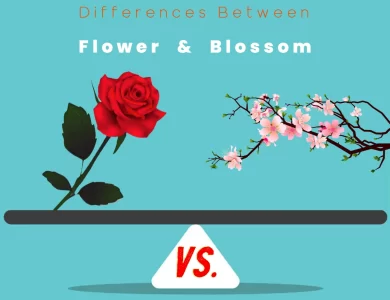
| Aspect | Allow | Permit |
|---|---|---|
| Definition | Granting authority or freedom without specifics. | Officially authorizing with specific conditions. |
| Formality and Legal Implications | Informal; may have legal implications but often less formal. | Formal; often implies legal or official authorization. |
| Use in Everyday Language | Common in everyday conversations. | Less common in informal conversations; often used in official contexts. |
| Specificity and Regulations | Implies open-ended permission without specific rules. | Involves specific rules, regulations, and conditions. |
| Authority and Control | Implies authority but may be less structured. | Involves structured and official authorization. |
| Passive vs. Active Voice | Used in both passive and active voice constructions. | More commonly used in the active voice. |
| Synonyms and Antonyms | Synonyms: Permit, Grant, Consent, Approve. Antonyms: Forbid, Prohibit, Deny, Disallow. | Synonyms: Allow, Authorize, License, Sanction. Antonyms: Ban, Forbid, Prohibit, Reject. |
| Legal Implications | Generally fewer legal consequences. | Violations can lead to fines, penalties, or legal action. |
| Cultural and Regional Variations | Usage may vary across cultures and regions. | Less susceptible to cultural nuances; standardized. |
| Contextual Sensitivity | Versatile and can be used in a wide range of situations. | Contextually sensitive; best for formal authorization. |
| Emotional Connotations | Neutral; denotes permission without strong emotional connotations. | May carry a sense of formality or bureaucracy. |
| Common Collocations | Collocations include “Allow access,” “Allow entry,” “Allow flexibility,” “Allow for.” | Collocations include “Issue a permit,” “Obtain a permit,” “Apply for a permit,” “Permit requirements.” |
| Flexibility and Negotiation | More flexible and suitable for negotiations. | Less flexible; changes may require a formal process. |
| Everyday Language vs. Formal Documentation | Common in everyday language and informal written communication. | More commonly found in formal documentation and regulatory contexts. |
Picture this: You’re in a conversation, and someone asks, “Can I do this?” The decision to say “allow” or “permit” isn’t just a matter of preference; it’s about conveying your intentions and expectations clearly. “Allow” suggests a more open-ended, casual granting of permission. It’s like opening the door and saying, “Sure, come on in.” On the other hand, “permit” adds a layer of formality and specificity to your permission, akin to handing someone an invitation with all the event details neatly laid out.
Differences Between Allow and Permit
The main differences between “allow” and “permit” lie in the level of formality and specificity. “Allow” is a more casual term, granting permission without necessarily specifying conditions, often used in everyday conversations. On the other hand, “permit” implies a formal, official authorization with specific rules and regulations attached, commonly found in legal or regulatory contexts. Understanding these distinctions is crucial for clear communication and compliance with rules and regulations.
Definitions and Meanings
Allow
The word “allow” is a verb that means to give someone or something the authority, right, or freedom to do a specific action or task. When you allow someone to do something, you are granting them permission without necessarily specifying the conditions or regulations surrounding the activity.
Permit
“Permit,” also a verb, shares a similar meaning but with a slight nuance. It means to officially authorize or grant permission, often with specific rules, regulations, or conditions attached. When you permit someone to do something, you are allowing it within a predefined framework.
Table 1: Definitions
| Word | Definition |
|---|---|
| Allow | Granting authority or freedom without specifics. |
| Permit | Officially authorizing with specific conditions. |
Formality and Legal Implications
Allow
“Allow” is a more general and informal term. It is commonly used in everyday language and casual conversations. While it can have legal implications, it is often used in less formal situations.
Permit
“Permit” carries a stronger sense of formality and often implies a legal or official authorization. Permits are commonly used in various legal contexts, such as construction permits, licenses, or other regulatory matters.
In essence, when you “allow” something, it might be a simple agreement between individuals, while when you “permit” something, it typically involves legal or official consent.
Use in Everyday Language
Allow
“Allow” is frequently used in everyday conversations to indicate consent or agreement. It is versatile and can be used in various contexts, such as:
- “I’ll allow you to borrow my book.”
- “They allowed us to bring our own snacks to the party.”
Permit
“Permit” is less common in informal conversations and more likely to be found in situations involving rules, regulations, or official documents. Examples include:
- “You need a permit to build a fence in this neighborhood.”
- “The city issued a permit for the street fair.”
Specificity and Regulations
Allow
When you “allow” something, you are not necessarily outlining specific rules or conditions. It implies a more open-ended permission. For instance, if you allow your child to play outside, you’re giving them the freedom to do so without specifying when, where, or for how long.
Permit
“Permit,” on the other hand, is often associated with specific rules and conditions. For example, if you obtain a fishing permit, it will typically outline where you can fish, what type of fish you can catch, and the duration of the permit’s validity.
Table 2: Everyday Usage
| Context | Allow | Permit |
|---|---|---|
| Borrowing a book | “I’ll allow you to borrow my book.” | Not commonly used; may sound overly formal. |
| Building a fence | Not commonly used; may sound overly informal. | “You need a permit to build a fence here.” |
| Playing outside | “I’ll allow you to play outside.” | Not commonly used in this context. |
Authority and Control
Allow
“Allow” often implies a sense of authority or control, where the person granting permission has the power to decide whether something is permitted or not. However, this authority may be less structured and more subjective.
Permit
“Permit” typically involves a structured and formal process where an authorized entity, such as a government agency or organization, grants permission based on predefined criteria and regulations. It often involves clear guidelines and checks.
Passive vs. Active Voice
Allow
“Allow” can be used in both passive and active voice constructions. For example:
- Active Voice: “I allow you to use my laptop.”
- Passive Voice: “You are allowed to use my laptop.”
Permit
“Permit” is more commonly used in the active voice to emphasize the action of granting permission. For example:
- Active Voice: “The city permits outdoor events in the park.”
- Passive Voice: Less commonly used in passive constructions.
Synonyms and Antonyms
Allow
Synonyms:
- Permit
- Grant
- Consent
- Approve
Antonyms:
- Forbid
- Prohibit
- Deny
- Disallow
Permit
Synonyms:
- Allow
- Authorize
- License
- Sanction
Antonyms:
- Ban
- Forbid
- Prohibit
- Reject
Examples in Context
Allow
- “She allowed her children to stay up late on weekends.”
- “The teacher allowed extra time for the students to complete the exam.”
Permit
- “The city issued a permit for the construction of a new skyscraper downtown.”
- “To fish in the national park, you must obtain a special permit.”
Legal Implications and Consequences
Allow
When you “allow” something, especially in informal settings, it may not always carry significant legal consequences. For instance, if you allow a friend to use your bicycle and it gets damaged, the responsibility and liability may be less clear-cut.
Permit
“Permit,” on the other hand, often involves legal obligations and responsibilities. When you obtain a permit, you are bound by the terms and conditions outlined in the permit, and failing to adhere to them can lead to legal consequences. For example, if you violate the terms of a building permit, you may face fines or even legal action.
Table 3: Legal Implications
| Aspect | Allow | Permit |
|---|---|---|
| Liability | Often less clear-cut; depends on the specific situation. | Clear legal obligations and responsibilities. |
| Consequences of Violation | Generally fewer legal consequences. | Violations can lead to fines, penalties, or legal action. |
Cultural and Regional Variations
Allow
The usage of “allow” can vary across cultures and regions. In some cultures, giving permission may be implied rather than explicitly stated. For example, in some Asian cultures, it is common for elders to grant permission without using the word “allow” explicitly.
Permit
“Permit” is a more standardized term with less variation in its usage across cultures and regions. It is often associated with official documentation and regulatory processes, making it less susceptible to cultural nuances.
Contextual Sensitivity
Allow
The appropriateness of using “allow” depends on the context and the level of formality required. It is a versatile word that can be used in a wide range of situations, from casual conversations to professional settings.
Permit
“Permit” is contextually sensitive and is best reserved for situations where formal authorization is required or when specific rules and regulations need to be adhered to. It may sound overly formal or out of place in everyday conversations.
Emotional Connotations
Allow
“Allow” is a neutral word that does not carry strong emotional connotations. It simply denotes permission or consent without implying any particular attitude or feeling.
Permit
“Permit” can sometimes carry a sense of formality or bureaucracy, which may evoke emotions of compliance or adherence to regulations. In some cases, it may be associated with a sense of necessity rather than choice.
Common Collocations
Allow
“Allow” is often used in various collocations (word combinations) in everyday language. Some common collocations include:
- “Allow access”
- “Allow entry”
- “Allow flexibility”
- “Allow for”
Permit
“Permit” also has its own set of common collocations, typically related to official authorizations and documents:
- “Issue a permit”
- “Obtain a permit”
- “Apply for a permit”
- “Permit requirements”
Flexibility and Negotiation
Allow
“Allow” is a more flexible word that can be used in negotiations or discussions. It allows room for adjustments and informal agreements. For example, if you allow your colleague to extend a project deadline, you can revisit the agreement later if needed.
Permit
“Permit” tends to be less flexible because it often involves predefined rules and regulations. Changes to a permit may require a formal process or request.
Everyday Language vs. Formal Documentation
Allow
“Allow” is prevalent in everyday language and can be used in casual conversations, emails, and informal written communication. It is suitable for situations where a high level of formality is not required.
Permit
“Permit” is more commonly found in formal documentation, such as permits, licenses, contracts, and legal agreements. It is a word of choice in situations that demand precision and adherence to established regulations.
Summary and Choosing the Right Word
In conclusion, the choice between “allow” and “permit” boils down to the context, formality, and specificity of the situation. Understanding the subtle differences between these words can enhance your communication skills and ensure that you convey your intentions clearly.
Table 4: Quick Reference for Choosing the Right Word
| Consideration | Choose “Allow” | Choose “Permit” |
|---|---|---|
| Everyday conversations | ✓ | Use sparingly, in more formal or regulatory contexts. |
| Formal documentation | Use sparingly; opt for formal terms. | ✓ |
| Legal implications | ✓ (with caution) | ✓ (when dealing with official authorizations) |
| Specificity and rules | ✓ (with less specificity) | ✓ (when specific regulations are essential) |
| Cultural variations | ✓ (consider cultural norms) | ✓ (preferred for cross-cultural clarity) |
| Emotional connotations | Neutral | May carry formal or bureaucratic connotations. |
| Flexibility in agreements | ✓ (for informal negotiations) | Use for formal and regulated situations. |
By keeping these distinctions in mind, you can use “allow” and “permit” with greater accuracy, whether you’re granting permission in everyday conversations or navigating formal processes and regulations.
FAQs
The primary difference between “allow” and “permit” is the level of formality and specificity. “Allow” is a more informal term, indicating permission without specific conditions. “Permit,” on the other hand, implies a formal and official authorization often accompanied by specific rules and regulations.
While “allow” and “permit” are often used interchangeably in everyday language, they have subtle distinctions. “Allow” is versatile and suitable for casual conversations, whereas “permit” is better suited for formal and official contexts.
Yes, there can be legal implications. “Permit” is more likely to carry legal weight, especially in situations involving official documentation or regulations. Violating the terms of a permit can lead to legal consequences.
Use “allow” in everyday conversations or informal situations where formality is not required. Reserve “permit” for formal or official authorizations and contexts where specific rules and regulations are essential.
Yes, cultural variations may affect how these words are used or interpreted. “Permit” is less susceptible to cultural nuances and is often more standardized in its usage.
Yes, both “allow” and “permit” can be used in passive voice constructions, although “permit” is more commonly used in the active voice to emphasize official authorization.
Yes, “allow” has synonyms like “permit,” “grant,” “consent,” and “approve,” while its antonyms include “forbid,” “prohibit,” “deny,” and “disallow.” “Permit” has synonyms such as “allow,” “authorize,” “license,” and “sanction,” and its antonyms include “ban,” “forbid,” “prohibit,” and “reject.”
Read More:
Contents
- Differences Between Allow and Permit
- Definitions and Meanings
- Formality and Legal Implications
- Use in Everyday Language
- Specificity and Regulations
- Authority and Control
- Passive vs. Active Voice
- Synonyms and Antonyms
- Examples in Context
- Legal Implications and Consequences
- Cultural and Regional Variations
- Contextual Sensitivity
- Emotional Connotations
- Common Collocations
- Flexibility and Negotiation
- Everyday Language vs. Formal Documentation
- Summary and Choosing the Right Word
- FAQs






